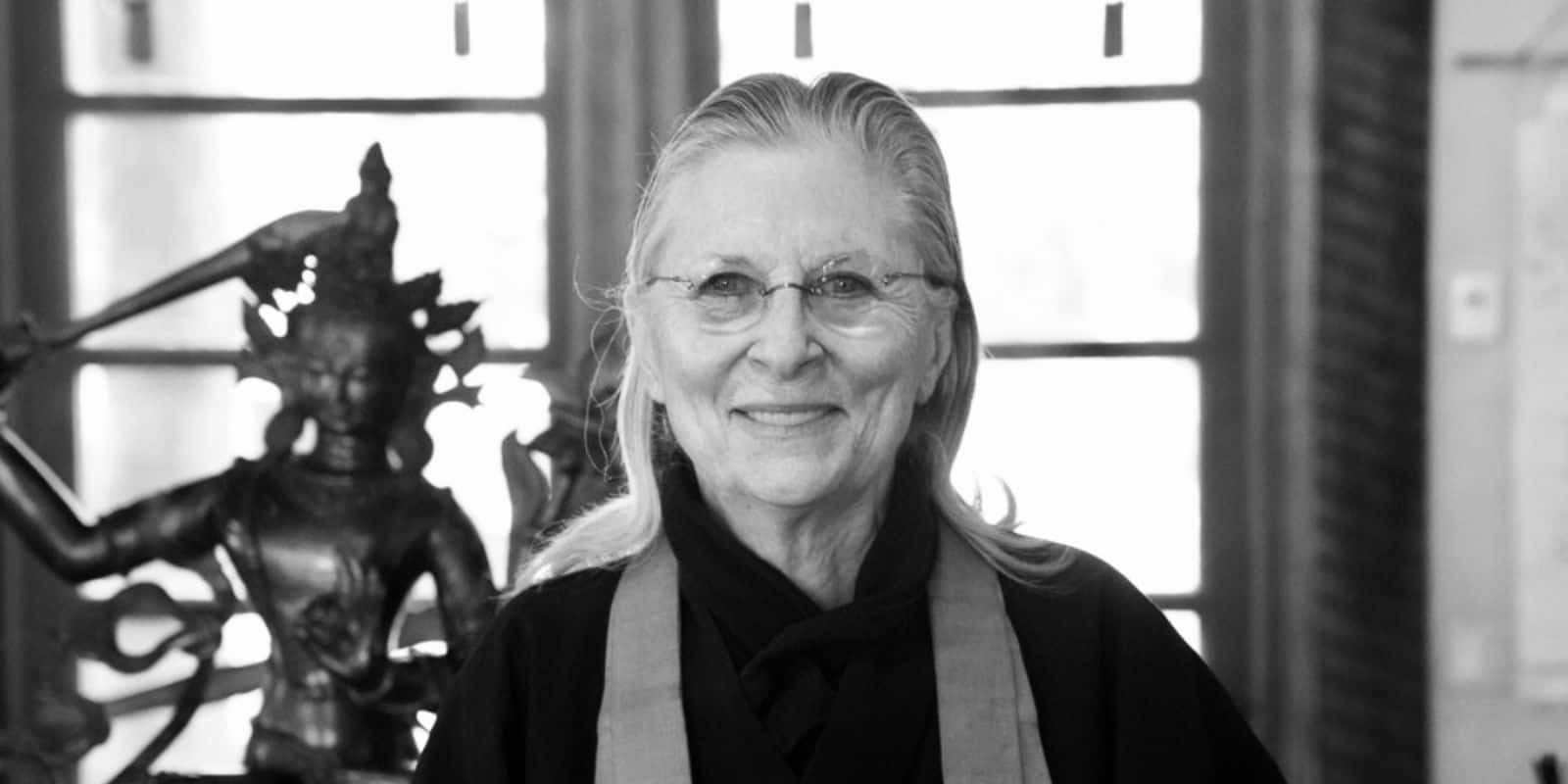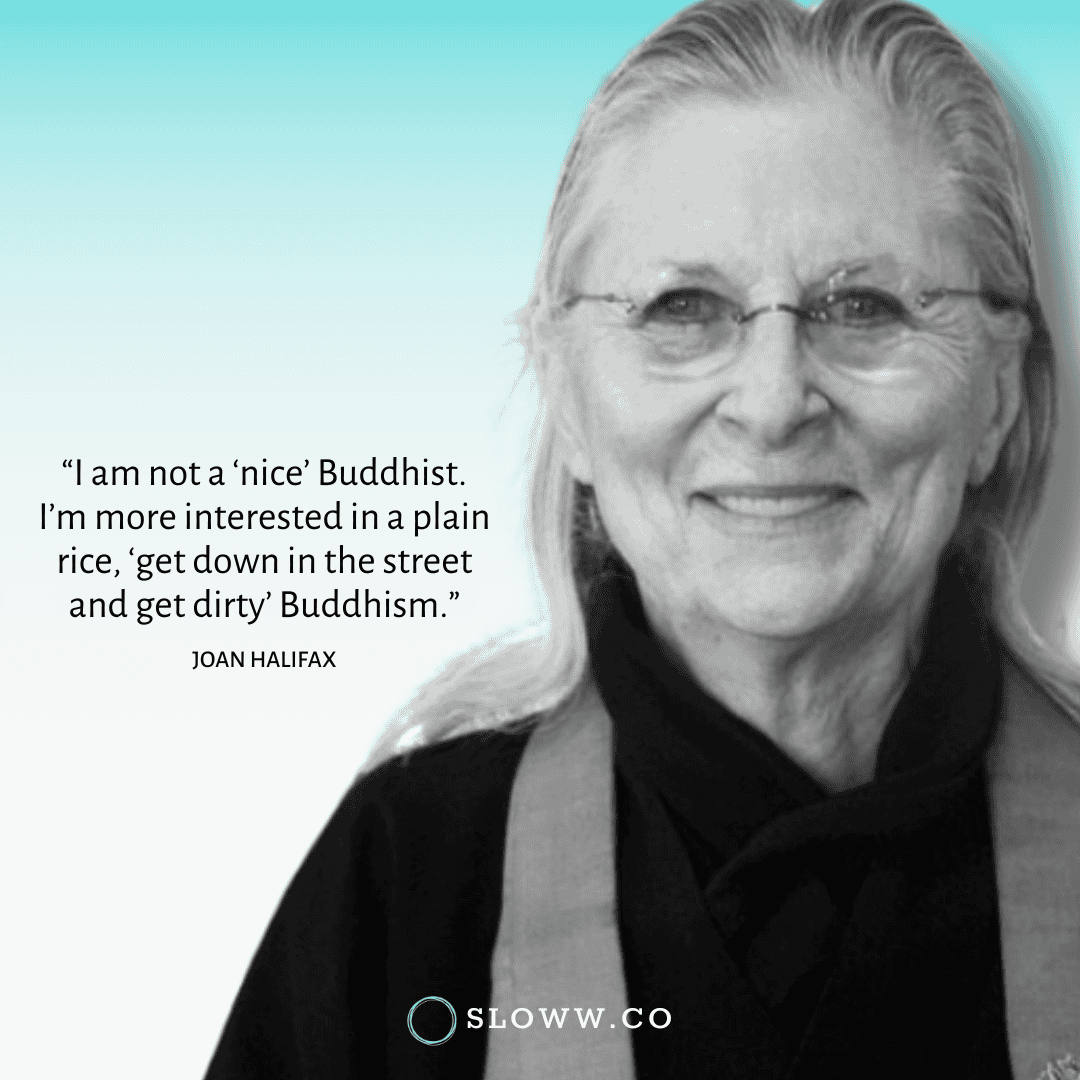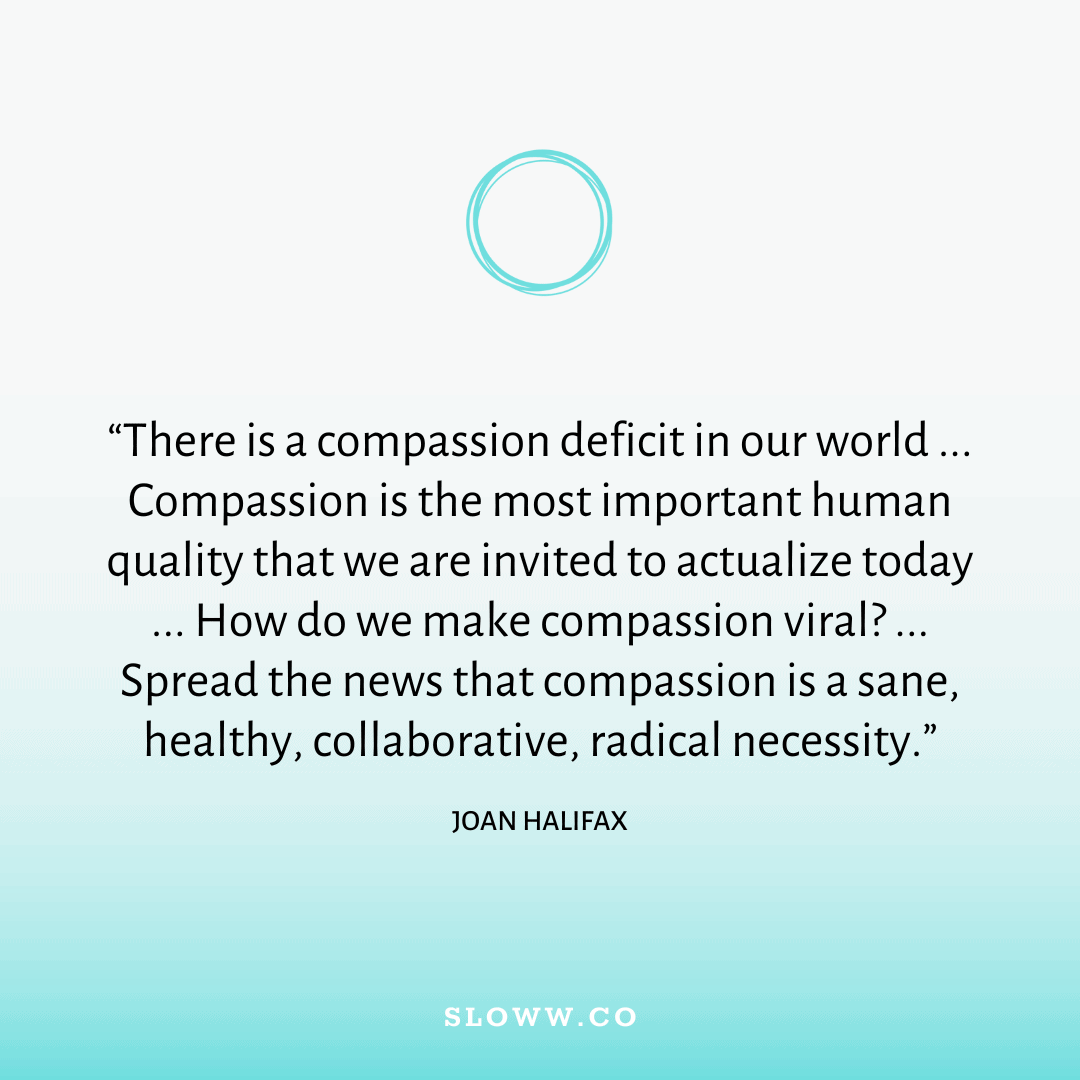This page lists some of the all-time best Joan Halifax quotes. Enjoy!
Page Contents:
- Suffering & Happiness Quotes
- Buddhism & Meditation Quotes
- Compassion Quotes
- Wise Hope Quotes
- GRACE Method Quotes

50+ Joan Halifax Quotes on Compassion, Wise Hope, GRACE Method, & More
Joan Halifax Quotes on Suffering & Happiness
“Understand that all beings are really aspiring to be happy, even the most deluded ones and the most politically confused ones.” — Joan Halifax
“Helping others makes us happy.” — Joan Halifax
“Beneath the narrative, beneath the actions of any one of those individuals, is a human being.” — Joan Halifax
“When systems break down, the ones who have the resilience to actually repair themselves move to a higher order of organization.” — Joan Halifax
“The experience of grief is profoundly humanizing.” — Joan Halifax
“Respect is about holding all beings and things, including all species on this earth, in equal regard.” — Joan Halifax
“Open up to the world in a way where we’re in this beneficial, non-separate, non-objectifying relationship with so-called ‘others.’” — Joan Halifax
“To stop in this world is to create the conditions where a lot of unusual experiences can rise up.” — Joan Halifax
“The more aware we become, the more responsible we recognize we are for what is and what will be.” — Joan Halifax
“The difference between doing something and doing nothing is everything.” — Joan Halifax
Joan Halifax Quotes on Buddhism & Meditation
“I am not a ‘nice’ Buddhist. I’m more interested in a plain rice, ‘get down in the street and get dirty’ Buddhism.” — Joan Halifax
“I’m not a sectarian Buddhist. What I am, though, is someone who wants to help people see inside.” — Joan Halifax
“We actually don’t even use the word ‘meditation’ … We call it ‘reflective practices’ or ‘contemplative interventions.’” — Joan Halifax
“Our realization in meditation practice, the sort of sign of it, is that we recognize that we’re deeply interconnected with all beings and things.” — Joan Halifax
“When you are in a state of deep internal stillness, you see the truth of change, the truth of impermanence, that’s constantly in flow moment by moment. And, that becomes a kind of insight that liberates you from the futility of the kind of grief that disallows our own humanity to emerge.” — Joan Halifax
“In Buddhism, we say it takes a strong back and a soft front. It takes tremendous strength of the back to uphold yourself in the midst of conditions, and that is the mental quality of equanimity. But, it also takes a soft front, the capacity to really be open to the world as it is, to have an undefended heart.” — Joan Halifax
“When we practice meditation, we actually take a posture that exemplifies the qualities of mind and heart that we’re endeavoring to cultivate in the practice … There’s strength in our back which exemplifies equanimity and our capacity to uphold ourselves in the midst of any conditions … We also have an open front—we have ourselves open to the world so that we can increase our subjectivity to include this space or to include the experience of another.” — Joan Halifax
“Our actual posture exemplifies equanimity and compassion and the interdependence between equanimity and compassion.” — Joan Halifax
“So often it’s ‘strong front’ defended by views, and ‘soft back’ operating out of fear.” — Joan Halifax
Joan Halifax Quotes on Compassion
“There is a compassion deficit in our world … There’s a kind of deficit of compassion in our culture today that is affecting everyone … How do we make compassion viral? … Disrupt complacency, and engage compassion. Spread the news that compassion is a sane, healthy, collaborative, radical necessity.” — Joan Halifax
“Compassion is the most important human quality that we are invited to actualize today … The most important thing that we can do is to actualize compassion, because compassion gives you the attentional balance, emotional balance, and insight that allows you to transform even the experiences that have caused us distress, have caused us the most suffering, into qualities of strength.” — Joan Halifax
“If compassion is so good for us, why don’t we train our children in compassion?” — Joan Halifax
“Compassion ensures human survival. Survival of the kindest.” — Joan Halifax
“The secret sauce of compassion: connectedness, relatedness.” — Joan Halifax
“There’s no such thing as compassion fatigue.” — Joan Halifax
“Compassion is the capacity to attend to the experience of others, to feel concern so you can attend to others suffering, to be able to really sense into what will serve others, and to have the capacity to serve directly or indirectly.” — Joan Halifax
“Compassion is not empathy, although it includes the process of empathy. Empathy is about cognitive and affective resonance, whereas compassion is feeling concerned for and the desire to alleviate the suffering of others.” — Joan Halifax
“It’s difficult to actually train people in compassion—not as an acquired skill, but to actually create the conditions where compassion is an emergent process in our subjectivity.” — Joan Halifax
“Compassion is not possible without attentional balance. Our capacity to actually look deeply into what is happening in the present moment necessitates that we are able to be very grounded and not divided in our attention, not dispersed in our attention, nor distracted.” — Joan Halifax
“Compassion actually enhances resilience, enhances immune response, enhances longevity, and it’s morally elevating.” — Joan Halifax
“Compassion is comprised of that capacity to see clearly into the nature of suffering. It is that ability to really stand strong and to recognize also that I’m not separate from this suffering.” — Joan Halifax
Joan Halifax Quotes on Wise Hope
“It’s not conventional hope that I’m talking about. I have called this kind of hope ‘wise hope’ … Ordinary hope then is a form of suffering.” — Joan Halifax
“Hope is not the belief that everything will turn out well … Hope is not a story based on optimism that everything will be okay.” — Joan Halifax
“Wise hope is born of radical uncertainty rooted in the unknown and the unknowable … Wise hope requires that we open ourselves to what we do not know, what we cannot know—that we open ourselves to being perpetually surprised. Wise hope comes alive through the premise that we don’t know what will happen and that in the spaciousness of radical uncertainty, of surprise, is also the space in which we can engage.” — Joan Halifax
“It’s when we discern courageously and deeply, and at the same time realize we don’t know what will happen, that wise hope comes alive. It comes alive in the midst of improbability, impermanence, and possibility. It’s exactly at this nexus, at this crossroads, where the emergence for the imperative to act rises up.” — Joan Halifax
“Wise hope is not seeing things unrealistically, but rather seeing things as they are, including the truth of impermanence as well as the truth of suffering—both as existence and the possibility of its transformation for better or for worse.” — Joan Halifax
Joan Halifax Quotes on GRACE Method
G.R.A.C.E. Method for Cultivating Compassionate Interactions … “We can do it now, that’s the beautiful part of it. We don’t have to wait. We can gather our attention now, we can remember really why we’re here, we can attune to ourselves and be really present, we can sense into others, we can look deeply into our fundamental wisdom and see what will really serve, and then we engage.” — Joan Halifax
- G: Gathering attention—How do we get really grounded? How do we focus? How do we get really present? By gathering our attention—usually through the medium of the body.
- R: Recalling intention—How do we touch into our motivation—the ethical foundation for what it means to be a full human being in our world today?
- A: Attuning to self/other—Attuning first to oneself at the levels of body (somatic), heart (affective), and mind (cognitive)? Really being able to tune into our biases, to see where we’re at, and to prime those networks that actually relate to our capacity to sense into the experience of others and then sensing into the experience of others.
- C: Considering what will serve—To use insight, metacognition, our basic wisdom, as a means for engaging in interactions in ways that are really principled.
- E: Engaging and ending—To engage with people, to engage with communities, and then to complete that engagement.
You May Also Enjoy:
- Browse all Quote Posts






